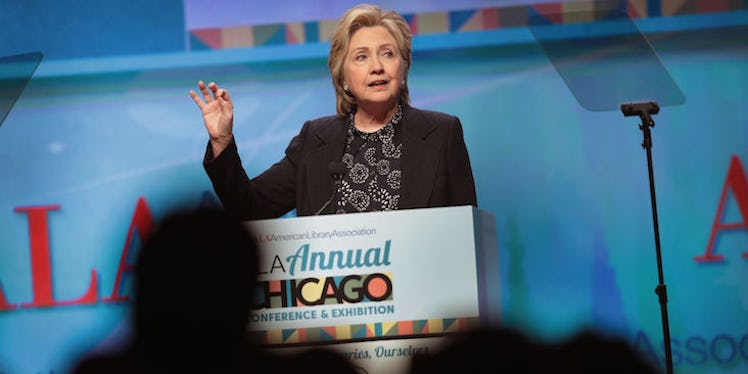
Hillary Clinton Talks About Magical Powers Of The 'Harry Potter' Books
The first Harry Potter book came out 20 years ago this week, which has ushered in a wave of nostalgia among fans of the series.
Two decades later, the magic of the books is still going strong, so much so that former Secretary of State Hillary Clinton took a moment to praise the Harry Potter series at the American Library Association conference in Chicago on Tuesday, June 27, Yahoo News reports.
Clinton spoke about how the books, written by J.K. Rowling, help breed empathy and compassion toward marginalized groups like refugees.
She said,
Years of data suggests that reading fiction helps build empathy. It helps us put ourselves in other peoples' shoes. One study even found that young people who read the Harry Potter books, which first came out 20 years ago this week, were more compassionate toward immigrants, refugees and members of the LGBT community.
Clinton added, "And so, it's impossible for me to overstate the impact on children who see themselves in the pages of a book and are introduced to people unlike themselves."
Research backs up what Clinton said about Harry Potter.
While Clinton didn't mention the exact study she was referencing in her remarks, research published in the Journal of Applied Psychology found reading the Harry Potter series "significantly" improves attitudes toward stigmatized groups such as immigrants, homosexuals, and refugees.
The study, "The greatest magic of Harry Potter: Reducing prejudice," found students in elementary and high schools in the UK and Italy were less prejudiced toward minority groups if they'd read Harry Potter and identified, specifically, with the main character (Harry).
When you stop to think about it, this makes a lot of sense.
The Harry Potter series is fundamentally about love and tolerance.
Throughout the series, the character Harry Potter often exhibited far more tolerance than other characters toward stigmatized groups in his magical world, such as house elves or "Mudbloods," for example.
In the books, house elves are essentially magical elf slaves, and "Mudblood" is a term used as an insult toward wizards or witches born of non-magical parents (it's a more or less akin to a racial slur in the real world).
When you read the books, you can't help but feel a sense of outrage for how these groups are treated by certain witches and wizards, and find yourself cheering whenever Harry and his friends come to their defense.
So it's hardly surprising that research shows kids who've read the Harry Potter series are generally better people because of it. The books instill within you a strong disdain for bullies, and anyone who exhibits hatred toward the vulnerable.
As Dumbledore himself put it: "Differences of habit and language are nothing at all if our aims are identical and our hearts are open."